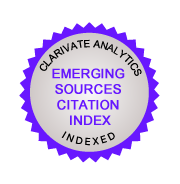On Detection of Plagiarism following actions can be taken:-
- Immediate rejection of the manuscript.
- Prohibition against all of the authors for any new submissions either individually or in combination with other authors of the manuscript, as well as in combination with any other authors.
- Prohibition against all of the authors from serving on the Editorial Board of IJCH.
- If an author submits a manuscript to IJCH with significant overlap with a manuscript submitted to another journal simultaneously, and this overlap is discovered during the review process or after the publications of both papers, the editor of the other journal is notified and the case is treated as a severe plagiarism case.
- In the case of a publication being submitted that was originally published in another language, the title, date and journal of the original publication must be identified by the authors, and the copyright must be obtained. The editor may accept such a translated publication to bring it to the attention of a wider audience.
- In case Author wants to use material from the other Authors Article then it is mandatory to cite the same in references. Else the Author needs to change the language completely and use his/ her own language.






